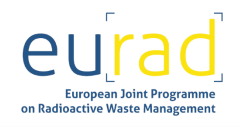EURAD project - working together for a safe radioactive waste management
 EURAD - the European Joint Programme on Radioactive Waste Management will help the EU member states to obtain the know-how required to implement safe and long-term management of radioactive waste. The programme, launched on June 1, 2019 at the EURADWASTE ’19 Conference held in Pitesti-Romania, aims to:
EURAD - the European Joint Programme on Radioactive Waste Management will help the EU member states to obtain the know-how required to implement safe and long-term management of radioactive waste. The programme, launched on June 1, 2019 at the EURADWASTE ’19 Conference held in Pitesti-Romania, aims to:
- develop, maintain and consolidate the scientific and technical bases necessary to ensure the safe management of radioactive waste;
- address important and complex issues in the field and facilitate connections between experts;
- ensure the knowledge management and their transfer between organizations, EU Member States and generations;
- Involve the civil society in the decision-making process.
In the first wave, EURAD runs 7 Work Packages dedicated to research and development activities, 2 Work Packages for networking and 3 Work Packages devoted to knowledge management.
As national mandated actor, RATEN ICN participates in the R&D Work Packages CORI (Cement-Organics-Radionuclide Interaction) and FUTURE (Fundamental understanding on radionuclide migration), and in the networking Work Packages ROUTES (Waste management routes in Europe from cradle to grave) and UMAN (Uncertainty Management multi-Actor Network).
RATEN ICN's contribution to FUTURE consists in the investigation of technetium retention mechanisms on clay materials under controlled redox conditions (O and Eh content). Experimental works are performed to study the influence of the Fe II / Fe III ratio in clay minerals and of the redox changes on the reversibility of Tc sorption. Sorption / diffusion experiments will be carried out on clay minerals present in the red clay formation of the Saligny site (Romania), as well as on natural samples from the red clay layer. Sorption data will be correlated with the composition of the clay samples, with a particular focus on the content and location of total Fe and active redox Fe in these materials, which will be as well investigated.
In CORI, RATEN ICN contributes to a better understanding of the complex processes occurring between cement, organics and radionuclides. On one side, the sorption / desorption tests investigate the interaction of organic C-14 compounds arising from the degradation of spent ionic resins with the cement environments in different degradation states, looking in particular to the potential competitive effect of Fe on the sorption properties. On other side, the effect of organic compounds and the influence of Ca (as complexing ion) on the Ni2+ mobility in cementitious environment will be as well investigated.
Within ROUTES, RATEN ICN participates in the exchanges of information on the classification of the radioactive waste, in the review of the management routes of operational waste and in the identification of the domestic radioactive waste that cannot meet the acceptance criteria for the near-surface and geological repositories planned to be built in Romania. In cooperation with ONDRAF / NIRAS and GSL, RATEN ICN will organize in Romania the workshop on “Sharing experience on waste management with / without WAC available ".
In UMAN, RATEN ICN leads the activities devoted to understand how the uncertainties characterisation, their significance for safety and evolution have been approached and are seen by different kind of actors involved in radioactive waste management: research entities, radioactive waste organisations and TSOs. A broad range of safety-relevant uncertainties associated to waste inventory, site and geosphere, spent nuclear fuel and human aspects have been identified and are currently analysed based on the input received from a large number of participants in the EURAD Programme.
Dr. Daniela Diaconu
RATEN ICN
daniela.diaconu@nuclear.ro